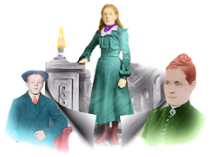


Origination 1.
|
First Names used as last name These are names that people were given or took that were relevant in some substance to a first name. Consider the following archetypical examples: "Harry Alan", in this instance the name "Alan" is being used as a surname the meaning of the surname used in this example would be that of a family member of "Alan". Another derivative of first names given as a last name., a son would have been known as "Arrys son" "Harry's son." son of Harry and from this we get the a last name [surname] of "Harrison". What we have discovered in this brief explanation is how first names that are now used as surnames came about. You can also consider at this point surnames that are now used as first names eg., consider Robert Clive, the name "Clive" as a surname is actually a place name meaning as "atte clyve" meaning dweller near or at the cliff or slope. We see the use of the name as a place name circa the 16th-17th. However in circa 18th- 19th century, is now is being used as a "first name" as in "Clive Smith". Place Names These are names that people took that were relevant as to where they lived or dwelled or came from. Commonly associated with the script "Dwellers near or at". consider the name "Ridgeway" it is a place name because it means dweller near or at the ridge way [high ridge]. Some Derivatives There are many place names that are used as names it can probably be easier to understand if we consider as a scenario medieval serf called "John of Eccles" it meant what it said meaning John from Eccles! now the expression is quite simply John Eccles. The "Eccles" now has more meaning as a family name because it no longer gives a descriptive of where the individual was from. But at one time it meant John dweller near or at the town of Eccles! There are numerous variants of place names some of which are no longer recognised as place names lets consider Caldecott which means dweller at the cold cottage. [wherever the cold cottage was!]
|
|
Pet Names These are name’s that people took that were pet names not to be confused with nicknames [please note a pet name has nothing to do with animal names] its a meaning of endearment. the pet names were names that were quite often shortened names and this was probably as an endearment to a person. Let us compare Pelle which is a pet name for Peter, Fippe for Phillip, Rich or Dick for Richard. The majority seem to be post 1066 and are difficult in a lot of instances to allocate to the pedigree. Nicknames Names which are spontaneously or adventitiously derived. The name could be taken from their colour consider ["red, black, white"] this could be attributed to the colour of their hair, skin, or some marking. It could be their gait, Twitch or posture consider "Lurch" this can be attributed to someone who' gait or handicap made them lurch around. The size and shape were also a symbolic representation of a nickname consider "Lofty" attributed to a tall person. These were names that people were known by. The nickname now becomes a bequeathment surname to their heirs. It’s interesting to note that there are many surnames that are in use today where all meaning, or inference is now lost. Occupational Names On the surface this would appear to be quite straight forward people used the name of their trade or occupation as their name, as with John of Eccles we can now have John the blacksmith which is now John Smith. But we must not lose the meaning of the occupational name "smith", this is attributed to a worker in metal which is not necessarily iron or steel. When it is association with "black" [ the colour of raw iron] its meaning is then a worker in iron-blacksmith. The name belongs to the family name of "Faber" meaning [from memory!] "The hammer ringeth down" consider the old family name of the famous metal workers "Faberge". The variants of occupational names are far and wide and some of the greatest satisfaction that you can get is when trying to find out what the meaning of a name, is to find that it is from an occupation that is now long forgotten
|

| About us |
| Contact us |
| our policy |
| Viewing Notes |
| Acknowledgements |
| Yapp family |
| james Yapps Cockney history |
| William and Eliza |
| Hannah and Mathew |
| James William Yapp |
| Mathew and Alice |
| Aussie connection |
| Family not forgotten |
| Origination 1 |
| Origination 2 |
| Origination 3 |
| KSLI 1951 |
| KSLI journal |
| Journal pt.1 |
| Journal pt.2 |
| Bill Griffiths |
| LCpl Hanlon |
| Bob_West |
| KSLI Roll of Honour |
| News Clips |
| Military Career |
| George Yapp KIA Korea |
| George service pictures |
| Communications |
| Georges Letters 1 |
| Georges letters 2 |
| Last letters home |
| Georges Awards |
| UN Memorial Cemetery Korea |
| Georges Story |
| Exchange rates |
| World Time |
| Speed Tester |